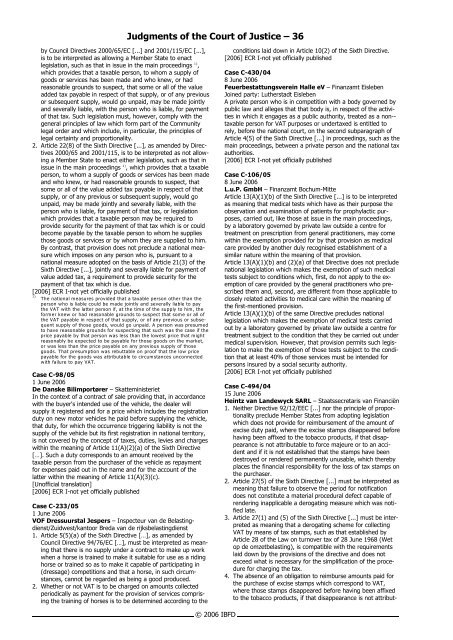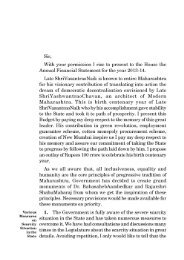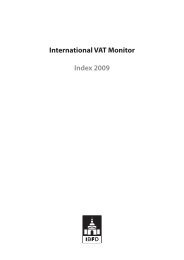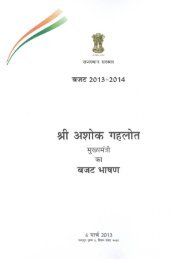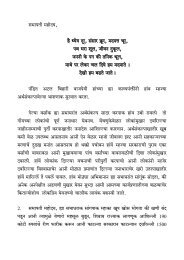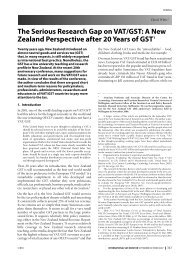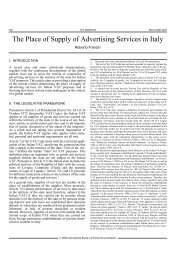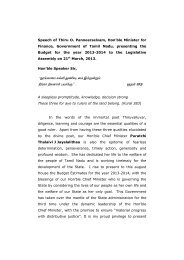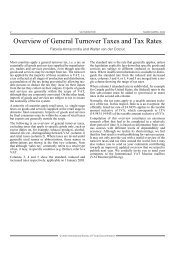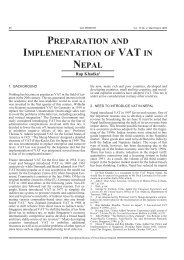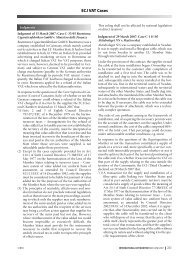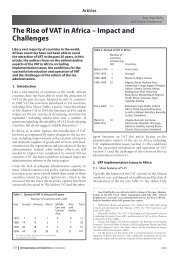European Court of Justice VAT cases 2006-3 - empcom.gov.in
European Court of Justice VAT cases 2006-3 - empcom.gov.in
European Court of Justice VAT cases 2006-3 - empcom.gov.in
Create successful ePaper yourself
Turn your PDF publications into a flip-book with our unique Google optimized e-Paper software.
y Council Directives 2000/65/EC [...] and 2001/115/EC [...],<br />
is to be <strong>in</strong>terpreted as allow<strong>in</strong>g a Member State to enact<br />
1)<br />
legislation, such as that <strong>in</strong> issue <strong>in</strong> the ma<strong>in</strong> proceed<strong>in</strong>gs ,<br />
which provides that a taxable person, to whom a supply <strong>of</strong><br />
goods or services has been made and who knew, or had<br />
reasonable grounds to suspect, that some or all <strong>of</strong> the value<br />
added tax payable <strong>in</strong> respect <strong>of</strong> that supply, or <strong>of</strong> any previous<br />
or subsequent supply, would go unpaid, may be made jo<strong>in</strong>tly<br />
and severally liable, with the person who is liable, for payment<br />
<strong>of</strong> that tax. Such legislation must, however, comply with the<br />
general pr<strong>in</strong>ciples <strong>of</strong> law which form part <strong>of</strong> the Community<br />
legal order and which <strong>in</strong>clude, <strong>in</strong> particular, the pr<strong>in</strong>ciples <strong>of</strong><br />
legal certa<strong>in</strong>ty and proportionality.<br />
2. Article 22(8) <strong>of</strong> the Sixth Directive [...], as amended by Directives<br />
2000/65 and 2001/115, is to be <strong>in</strong>terpreted as not allow<strong>in</strong>g<br />
a Member State to enact either legislation, such as that <strong>in</strong><br />
1)<br />
issue <strong>in</strong> the ma<strong>in</strong> proceed<strong>in</strong>gs , which provides that a taxable<br />
person, to whom a supply <strong>of</strong> goods or services has been made<br />
and who knew, or had reasonable grounds to suspect, that<br />
some or all <strong>of</strong> the value added tax payable <strong>in</strong> respect <strong>of</strong> that<br />
supply, or <strong>of</strong> any previous or subsequent supply, would go<br />
unpaid, may be made jo<strong>in</strong>tly and severally liable, with the<br />
person who is liable, for payment <strong>of</strong> that tax, or legislation<br />
which provides that a taxable person may be required to<br />
provide security for the payment <strong>of</strong> that tax which is or could<br />
become payable by the taxable person to whom he supplies<br />
those goods or services or by whom they are supplied to him.<br />
By contrast, that provision does not preclude a national measure<br />
which imposes on any person who is, pursuant to a<br />
national measure adopted on the basis <strong>of</strong> Article 21(3) <strong>of</strong> the<br />
Sixth Directive [...], jo<strong>in</strong>tly and severally liable for payment <strong>of</strong><br />
value added tax, a requirement to provide security for the<br />
payment <strong>of</strong> that tax which is due.<br />
[<strong>2006</strong>] ECR I-not yet <strong>of</strong>ficially published<br />
1)<br />
The national measures provided that a taxable person other than the<br />
person who is liable could be made jo<strong>in</strong>tly and severally liable to pay<br />
the <strong>VAT</strong> with the latter person if, at the time <strong>of</strong> the supply to him, the<br />
former knew or had reasonable grounds to suspect that some or all <strong>of</strong><br />
the <strong>VAT</strong> payable <strong>in</strong> respect <strong>of</strong> that supply, or <strong>of</strong> any previous or subsequent<br />
supply <strong>of</strong> those goods, would go unpaid. A person was presumed<br />
to have reasonable grounds for suspect<strong>in</strong>g that such was the case if the<br />
price payable by that person was less than the lowest price that might<br />
reasonably be expected to be payable for those goods on the market,<br />
or was less than the price payable on any previous supply <strong>of</strong> those<br />
goods. That presumption was rebuttable on pro<strong>of</strong> that the low price<br />
payable for the goods was attributable to circumstances unconnected<br />
with failure to pay <strong>VAT</strong>.<br />
Case C-98/05<br />
1 June <strong>2006</strong><br />
De Danske Bilimportører – Skattem<strong>in</strong>isteriet<br />
In the context <strong>of</strong> a contract <strong>of</strong> sale provid<strong>in</strong>g that, <strong>in</strong> accordance<br />
with the buyer's <strong>in</strong>tended use <strong>of</strong> the vehicle, the dealer will<br />
supply it registered and for a price which <strong>in</strong>cludes the registration<br />
duty on new motor vehicles he paid before supply<strong>in</strong>g the vehicle,<br />
that duty, for which the occurrence trigger<strong>in</strong>g liability is not the<br />
supply <strong>of</strong> the vehicle but its first registration <strong>in</strong> national territory,<br />
is not covered by the concept <strong>of</strong> taxes, duties, levies and charges<br />
with<strong>in</strong> the mean<strong>in</strong>g <strong>of</strong> Article 11(A)(2)(a) <strong>of</strong> the Sixth Directive<br />
[…]. Such a duty corresponds to an amount received by the<br />
taxable person from the purchaser <strong>of</strong> the vehicle as repayment<br />
for expenses paid out <strong>in</strong> the name and for the account <strong>of</strong> the<br />
latter with<strong>in</strong> the mean<strong>in</strong>g <strong>of</strong> Article 11(A)(3)(c).<br />
[Un<strong>of</strong>ficial translation]<br />
[<strong>2006</strong>] ECR I-not yet <strong>of</strong>ficially published<br />
Case C-233/05<br />
1 June <strong>2006</strong><br />
VOF Dressuurstal Jespers – Inspecteur van de Belast<strong>in</strong>gdienst/Zuidwest/kantoor<br />
Breda van de rijksbelast<strong>in</strong>gdienst<br />
1. Article 5(5)(a) <strong>of</strong> the Sixth Directive […], as amended by<br />
Council Directive 94/76/EC […], must be <strong>in</strong>terpreted as mean<strong>in</strong>g<br />
that there is no supply under a contract to make up work<br />
when a horse is tra<strong>in</strong>ed to make it suitable for use as a rid<strong>in</strong>g<br />
horse or tra<strong>in</strong>ed so as to make it capable <strong>of</strong> participat<strong>in</strong>g <strong>in</strong><br />
(dressage) competitions and that a horse, <strong>in</strong> such circumstances,<br />
cannot be regarded as be<strong>in</strong>g a good produced.<br />
2. Whether or not <strong>VAT</strong> is to be charged on amounts collected<br />
periodically as payment for the provision <strong>of</strong> services compris<strong>in</strong>g<br />
the tra<strong>in</strong><strong>in</strong>g <strong>of</strong> horses is to be determ<strong>in</strong>ed accord<strong>in</strong>g to the<br />
Judgments <strong>of</strong> the <strong>Court</strong> <strong>of</strong> <strong>Justice</strong> – 36<br />
© <strong>2006</strong> IBFD<br />
conditions laid down <strong>in</strong> Article 10(2) <strong>of</strong> the Sixth Directive.<br />
[<strong>2006</strong>] ECR I-not yet <strong>of</strong>ficially published<br />
Case C-430/04<br />
8 June <strong>2006</strong><br />
Feuerbestattungsvere<strong>in</strong> Halle eV – F<strong>in</strong>anzamt Eisleben<br />
Jo<strong>in</strong>ed party: Lutherstadt Eisleben<br />
A private person who is <strong>in</strong> competition with a body <strong>gov</strong>erned by<br />
public law and alleges that that body is, <strong>in</strong> respect <strong>of</strong> the activities<br />
<strong>in</strong> which it engages as a public authority, treated as a non-taxable<br />
person for <strong>VAT</strong> purposes or undertaxed is entitled to<br />
rely, before the national court, on the second subparagraph <strong>of</strong><br />
Article 4(5) <strong>of</strong> the Sixth Directive [...] <strong>in</strong> proceed<strong>in</strong>gs, such as the<br />
ma<strong>in</strong> proceed<strong>in</strong>gs, between a private person and the national tax<br />
authorities.<br />
[<strong>2006</strong>] ECR I-not yet <strong>of</strong>ficially published<br />
Case C-106/05<br />
8 June <strong>2006</strong><br />
L.u.P. GmbH – F<strong>in</strong>anzamt Bochum-Mitte<br />
Article 13(A)(1)(b) <strong>of</strong> the Sixth Directive [...] is to be <strong>in</strong>terpreted<br />
as mean<strong>in</strong>g that medical tests which have as their purpose the<br />
observation and exam<strong>in</strong>ation <strong>of</strong> patients for prophylactic purposes,<br />
carried out, like those at issue <strong>in</strong> the ma<strong>in</strong> proceed<strong>in</strong>gs,<br />
by a laboratory <strong>gov</strong>erned by private law outside a centre for<br />
treatment on prescription from general practitioners, may come<br />
with<strong>in</strong> the exemption provided for by that provision as medical<br />
care provided by another duly recognised establishment <strong>of</strong> a<br />
similar nature with<strong>in</strong> the mean<strong>in</strong>g <strong>of</strong> that provision.<br />
Article 13(A)(1)(b) and (2)(a) <strong>of</strong> that Directive does not preclude<br />
national legislation which makes the exemption <strong>of</strong> such medical<br />
tests subject to conditions which, first, do not apply to the exemption<br />
<strong>of</strong> care provided by the general practitioners who prescribed<br />
them and, second, are different from those applicable to<br />
closely related activities to medical care with<strong>in</strong> the mean<strong>in</strong>g <strong>of</strong><br />
the first-mentioned provision.<br />
Article 13(A)(1)(b) <strong>of</strong> the same Directive precludes national<br />
legislation which makes the exemption <strong>of</strong> medical tests carried<br />
out by a laboratory <strong>gov</strong>erned by private law outside a centre for<br />
treatment subject to the condition that they be carried out under<br />
medical supervision. However, that provision permits such legislation<br />
to make the exemption <strong>of</strong> those tests subject to the condition<br />
that at least 40% <strong>of</strong> those services must be <strong>in</strong>tended for<br />
persons <strong>in</strong>sured by a social security authority.<br />
[<strong>2006</strong>] ECR I-not yet <strong>of</strong>ficially published<br />
Case C-494/04<br />
15 June <strong>2006</strong><br />
He<strong>in</strong>tz van Landewyck SARL – Staatssecretaris van F<strong>in</strong>anciën<br />
1. Neither Directive 92/12/EEC [...] nor the pr<strong>in</strong>ciple <strong>of</strong> proportionality<br />
preclude Member States from adopt<strong>in</strong>g legislation<br />
which does not provide for reimbursement <strong>of</strong> the amount <strong>of</strong><br />
excise duty paid, where the excise stamps disappeared before<br />
hav<strong>in</strong>g been affixed to the tobacco products, if that disappearance<br />
is not attributable to force majeure or to an accident<br />
and if it is not established that the stamps have been<br />
destroyed or rendered permanently unusable, which thereby<br />
places the f<strong>in</strong>ancial responsibility for the loss <strong>of</strong> tax stamps on<br />
the purchaser.<br />
2. Article 27(5) <strong>of</strong> the Sixth Directive [...] must be <strong>in</strong>terpreted as<br />
mean<strong>in</strong>g that failure to observe the period for notification<br />
does not constitute a material procedural defect capable <strong>of</strong><br />
render<strong>in</strong>g <strong>in</strong>applicable a derogat<strong>in</strong>g measure which was notified<br />
late.<br />
3. Article 27(1) and (5) <strong>of</strong> the Sixth Directive [...] must be <strong>in</strong>terpreted<br />
as mean<strong>in</strong>g that a derogat<strong>in</strong>g scheme for collect<strong>in</strong>g<br />
<strong>VAT</strong> by means <strong>of</strong> tax stamps, such as that established by<br />
Article 28 <strong>of</strong> the Law on turnover tax <strong>of</strong> 28 June 1968 (Wet<br />
op de omzetbelast<strong>in</strong>g), is compatible with the requirements<br />
laid down by the provisions <strong>of</strong> the directive and does not<br />
exceed what is necessary for the simplification <strong>of</strong> the procedure<br />
for charg<strong>in</strong>g the tax.<br />
4. The absence <strong>of</strong> an obligation to reimburse amounts paid for<br />
the purchase <strong>of</strong> excise stamps which correspond to <strong>VAT</strong>,<br />
where those stamps disappeared before hav<strong>in</strong>g been affixed<br />
to the tobacco products, if that disappearance is not attribut-


